A week and a half after the devastating tremors in Turkey, the death toll in the country and in neighboring Syria continues to rise. Rescuers occasionally find survivors. While Germany is issuing the first facilitated visas, Turkish lawyers want to uncover construction botch with the help of an app.
The number of people killed by the earthquake in Turkey has risen to 39,672. This was announced by the Turkish Interior Minister Süleyman Soylu, according to the state news agency Anadolu. In Syria, around 5,900 people have died in connection with the devastating earthquakes. However, the number is only updated irregularly. Meanwhile, the salvage work in the affected regions of Turkey is continuing. Even after a week and a half, people are still being rescued alive - on Friday evening, for example, a man was rescued after 278 hours, as reported by the Istanbul Fire Department and state media. It was not initially known how the man was able to survive for so long. The information could not be independently verified.
The survivor was recovered from a mountain of rubble, according to a video shared online by Istanbul Mayor Ekrem Imamoglu. The mayor, who belongs to the political opposition, had sent rescue teams from Istanbul to the earthquake area.
Meanwhile, the Federal Foreign Office in Berlin announced that a few days after the announcement of a simplified procedure, the first visas to those affected by the earthquake had already been issued in Turkey.
The Federal Ministry of the Interior had announced that those affected by the earthquake should be able to quickly obtain regular visas for entry into Germany, which should be valid for three months. It's about "help in need". According to the Foreign Office, the simplified procedure applies to first and second-degree relatives of people who already live in Germany. The latter must submit a declaration of commitment that they will care for their dependents.
Meanwhile, more than a week and a half after the severe tremors, the salvage work in Turkey continues. According to Turkish Vice President Fuat Oktay, these are ongoing in fewer than 200 locations in the region.
In addition to the physical salvage, many people in Turkey and other countries have been working for days to collect information digitally and filter data for rescue teams. In Berlin and elsewhere, too, people showed their solidarity and took part, for example in the "Afetharita" project (translation: disaster map). Calls for help from victims, relatives or friends that were published on Twitter are made visible on a map. Artificial intelligence is at work here, but volunteers provide support and use Google Maps, for example, to check whether the coordinates and names of apartments make sense. In Turkey, buildings often have names. The goal: Using the centralized data, rescue workers should be able to act quickly and, above all, effectively.
Meanwhile, another type of application has been developed by the Union of Bar Associations of Turkey (TBB). The point here is to uncover botched construction work. Users should take photos of collapsed houses and take roughly 360-degree videos of pieces of concrete before debris is cleared away and with it evidence, a Cumhuriyet report explains. Reports of botched construction had previously made the rounds, of building rubble falling like sand in hands, of construction managers trying to escape abroad.












